5 Indian Mythological Characters Who Were Smarter Than Einstein!
Ankit Gupta | Apr 02, 2025, 04:15 IST
Einstein revolutionized physics, these mythological minds shaped reality itself, proving that intelligence is not just about discovery but about mastering existence.
Throughout history, intelligence has been measured in various ways—scientific discoveries, philosophical depth, strategic brilliance, and even metaphysical wisdom. Albert Einstein, a modern genius, revolutionized our understanding of space-time, relativity, and energy. However, Indian mythology presents figures whose intellect transcended mere science, encompassing cosmic wisdom, divine strategy, and metaphysical mastery. Let’s explore five such legendary figures who might have surpassed Einstein in intelligence, albeit in a different paradigm.

Krishna, the central figure of the Mahabharata and the Bhagavad Gita, was not just a divine being but a master strategist, philosopher, and statesman. His intelligence was multidimensional—he could manipulate time (Kala), understood Dharma in its most profound sense, and orchestrated events beyond human comprehension. While Einstein introduced relativity, Krishna explained the impermanence of time and space through the Bhagavad Gita. His strategic brilliance in the Mahabharata, where his counsel turned the tide of war, showcases intelligence that balanced morality and pragmatism. Furthermore, Krishna revealed the concept of Maya (illusion), a notion that aligns with modern quantum physics' uncertainty principle. Einstein’s intelligence was restricted to the realm of physics, but Krishna’s wisdom encompassed the entirety of existence, from micro to macrocosm.
Krishna’s intellect was not limited to war strategies; he also possessed a deep understanding of human psychology and governance. His guidance to Arjuna in the Bhagavad Gita is not just a discourse on duty but also an exploration of self-realization, much like the works of modern cognitive scientists who study human consciousness. Krishna’s ability to manage an entire kingdom, resolve complex socio-political conflicts, and foresee consequences that even great sages could not grasp, sets him apart as an unparalleled genius. His intellect was not bound by empirical data but was intuitive, holistic, and transcendental, making it vastly superior to the scientific rigor of Einstein’s age.
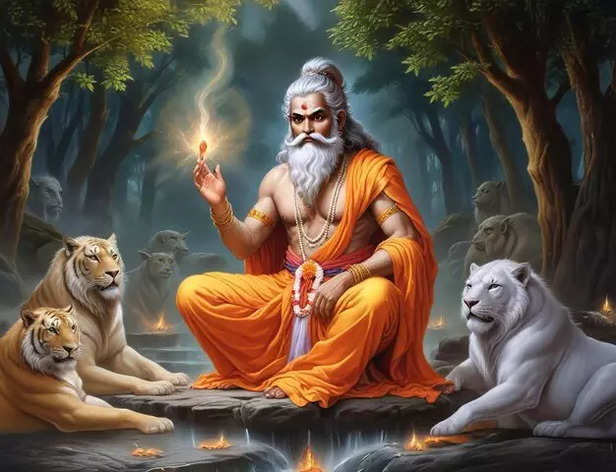
Vishwamitra started as a warrior but transcended his mortal limitations to become a sage of unparalleled wisdom. His journey from a king to a Brahmarishi was fueled by intellectual determination and scientific exploration. Legend states he created an alternate universe—something even modern physicists can only theorize. He formulated the Gayatri Mantra, a powerful energy-based mantra embodying vibrational physics that influences consciousness. His knowledge of cosmic forces allowed him to perform feats akin to alchemy, far ahead of modern science. While Einstein worked with relativity, Vishwamitra practically experimented with parallel realities.
The significance of Vishwamitra’s scientific achievements lies in his ability to harness cosmic energy. Unlike Einstein, who used mathematical models to predict phenomena like black holes and gravitational waves, Vishwamitra actively engaged with the fundamental forces of the universe to alter reality. He understood how sound vibrations could influence not only human consciousness but also the physical world, a field now being explored in modern cymatics and quantum resonance theories. Moreover, his ability to create Trishanku Swarga, a parallel plane of existence, hints at an understanding of multidimensional realities far more advanced than anything Einstein proposed in his lifetime.
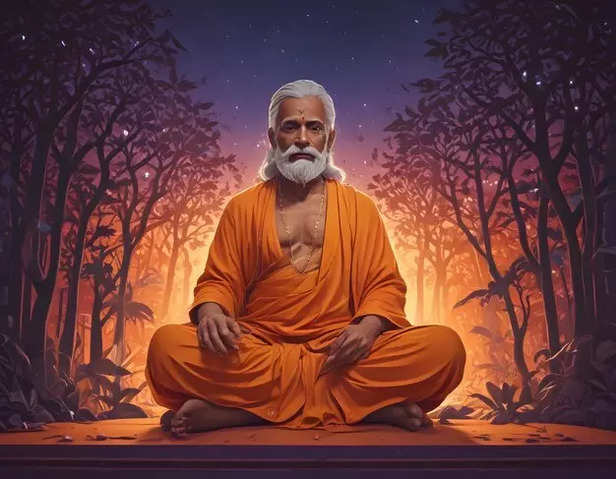
Shukracharya, the guru of the Asuras, was a master of sciences, especially in medical and military fields. He possessed Sanjeevani Vidya—the ability to revive the dead, a feat beyond modern medicine. The art of bringing the dead back to life remains a medical breakthrough yet to be achieved. He advised Asuras in warfare, using intelligence and technological superiority, and had deep knowledge of planetary influences and cosmic cycles. Einstein’s theories reshaped our understanding of the universe, but Shukracharya’s knowledge influenced life and death itself.
In addition to his scientific acumen, Shukracharya was an astute strategist and philosopher. He devised methodologies that ensured the long-term dominance of the Asuras, including economic policies, espionage, and war tactics that rival even the best military strategists of modern times. His knowledge of Ayurveda, surgical methods, and cosmic cycles indicates an understanding of medicine that blends with astrology and energy healing, a field still beyond the grasp of mainstream science. While Einstein’s theories opened doors to nuclear energy and modern technology, Shukracharya’s wisdom could manipulate biological processes at a fundamental level, an ability that remains a distant dream for contemporary medical science.
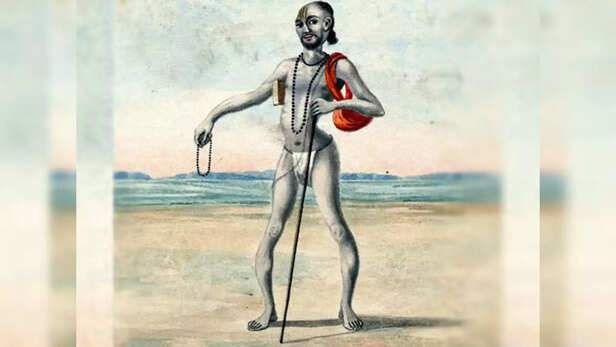
Born with eight deformities, Ashtavakra was an enlightened sage who transcended physical limitations to attain supreme knowledge. His discourse with King Janaka (Ashtavakra Gita) offers profound insights into consciousness and reality. He propounded that reality is an illusion (Maya), aligning with quantum mechanics’ idea of observer-based reality. He dismissed physical reality as transient, something physicists like Einstein grappled with in quantum theory. Ashtavakra’s teachings explain consciousness beyond the scope of modern neuroscience. Einstein questioned the nature of reality, but Ashtavakra dismissed it as an illusion long before science reached similar conclusions.
Ashtavakra’s understanding of non-duality (Advaita Vedanta) predates modern interpretations of quantum mechanics and the observer effect. He argued that the world exists only as a projection of the mind, a hypothesis that quantum physicists have only recently begun to explore. His ability to explain consciousness and existence as an interconnected, non-materialistic phenomenon aligns with the studies of leading theoretical physicists and neuroscientists who now debate the fundamental nature of reality. While Einstein struggled with the idea of quantum entanglement, Ashtavakra had already transcended such debates by establishing that material existence is secondary to consciousness itself.
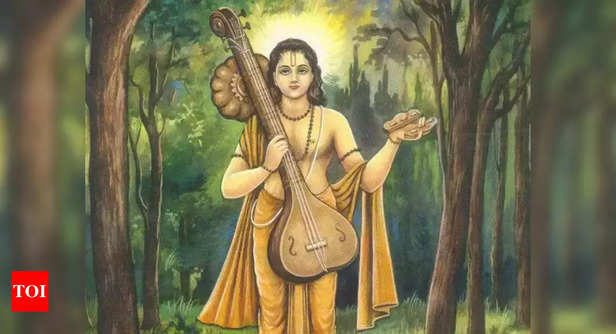
Narada was not just a celestial sage but also an information conduit between different realms. He possessed knowledge beyond time and space, often acting as the first “universal journalist.” He could appear anywhere, much like quantum particles in superposition. His understanding of the science of sound and its cosmic impact, reflected in Samaveda, showed an advanced grasp of vibrational physics. He influenced key mythological events through wisdom and insight, outthinking gods and demons alike. Einstein’s intelligence shaped physics, but Narada shaped history, using information and influence across celestial and mortal realms.
Narada’s wisdom was unparalleled because he understood the true power of information. In modern terms, he was the architect of a cosmic communication network, prefiguring the internet, mass media, and global diplomacy. His grasp of cause and effect, combined with his mastery of music and vibration, allowed him to influence the minds of both celestial beings and mortal kings. Unlike Einstein, who relied on empirical studies, Narada used intuition and foresight to shape the course of history. His ability to influence events without directly participating in them mirrors the modern understanding of quantum entanglement, where particles interact over vast distances without direct contact.
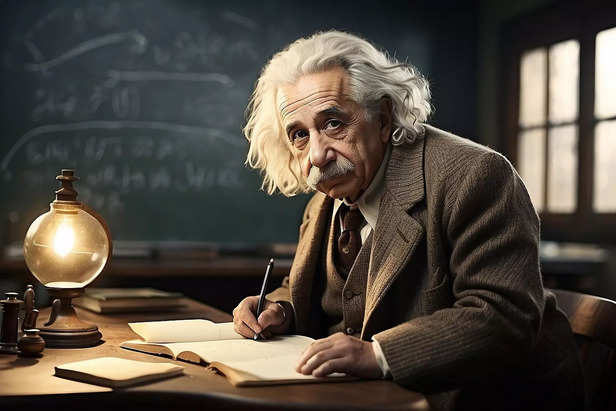
Einstein was undoubtedly a genius, but intelligence isn’t confined to equations and physics. The Indian mythological figures mentioned above embodied intelligence in its broadest sense—encompassing science, strategy, philosophy, and metaphysical wisdom. If Einstein changed the way we perceive the universe, these figures mastered the very fabric of existence itself. The contrast between Einstein’s brilliance and these mythological characters shows that intelligence is a multifaceted jewel—some polish it with numbers, while others wield it to shape reality itself. These figures not only theorized about the universe but actively shaped it, proving that the deepest intelligence lies not just in understanding the cosmos but in becoming one with it.

The mesmerizing hues of a peacock feather
Krishna, the central figure of the Mahabharata and the Bhagavad Gita, was not just a divine being but a master strategist, philosopher, and statesman. His intelligence was multidimensional—he could manipulate time (Kala), understood Dharma in its most profound sense, and orchestrated events beyond human comprehension. While Einstein introduced relativity, Krishna explained the impermanence of time and space through the Bhagavad Gita. His strategic brilliance in the Mahabharata, where his counsel turned the tide of war, showcases intelligence that balanced morality and pragmatism. Furthermore, Krishna revealed the concept of Maya (illusion), a notion that aligns with modern quantum physics' uncertainty principle. Einstein’s intelligence was restricted to the realm of physics, but Krishna’s wisdom encompassed the entirety of existence, from micro to macrocosm.
Krishna’s intellect was not limited to war strategies; he also possessed a deep understanding of human psychology and governance. His guidance to Arjuna in the Bhagavad Gita is not just a discourse on duty but also an exploration of self-realization, much like the works of modern cognitive scientists who study human consciousness. Krishna’s ability to manage an entire kingdom, resolve complex socio-political conflicts, and foresee consequences that even great sages could not grasp, sets him apart as an unparalleled genius. His intellect was not bound by empirical data but was intuitive, holistic, and transcendental, making it vastly superior to the scientific rigor of Einstein’s age.

Sage through ages
Vishwamitra started as a warrior but transcended his mortal limitations to become a sage of unparalleled wisdom. His journey from a king to a Brahmarishi was fueled by intellectual determination and scientific exploration. Legend states he created an alternate universe—something even modern physicists can only theorize. He formulated the Gayatri Mantra, a powerful energy-based mantra embodying vibrational physics that influences consciousness. His knowledge of cosmic forces allowed him to perform feats akin to alchemy, far ahead of modern science. While Einstein worked with relativity, Vishwamitra practically experimented with parallel realities.
The significance of Vishwamitra’s scientific achievements lies in his ability to harness cosmic energy. Unlike Einstein, who used mathematical models to predict phenomena like black holes and gravitational waves, Vishwamitra actively engaged with the fundamental forces of the universe to alter reality. He understood how sound vibrations could influence not only human consciousness but also the physical world, a field now being explored in modern cymatics and quantum resonance theories. Moreover, his ability to create Trishanku Swarga, a parallel plane of existence, hints at an understanding of multidimensional realities far more advanced than anything Einstein proposed in his lifetime.

Shukracharya
Shukracharya, the guru of the Asuras, was a master of sciences, especially in medical and military fields. He possessed Sanjeevani Vidya—the ability to revive the dead, a feat beyond modern medicine. The art of bringing the dead back to life remains a medical breakthrough yet to be achieved. He advised Asuras in warfare, using intelligence and technological superiority, and had deep knowledge of planetary influences and cosmic cycles. Einstein’s theories reshaped our understanding of the universe, but Shukracharya’s knowledge influenced life and death itself.
In addition to his scientific acumen, Shukracharya was an astute strategist and philosopher. He devised methodologies that ensured the long-term dominance of the Asuras, including economic policies, espionage, and war tactics that rival even the best military strategists of modern times. His knowledge of Ayurveda, surgical methods, and cosmic cycles indicates an understanding of medicine that blends with astrology and energy healing, a field still beyond the grasp of mainstream science. While Einstein’s theories opened doors to nuclear energy and modern technology, Shukracharya’s wisdom could manipulate biological processes at a fundamental level, an ability that remains a distant dream for contemporary medical science.

Sage Ashtavakra
Born with eight deformities, Ashtavakra was an enlightened sage who transcended physical limitations to attain supreme knowledge. His discourse with King Janaka (Ashtavakra Gita) offers profound insights into consciousness and reality. He propounded that reality is an illusion (Maya), aligning with quantum mechanics’ idea of observer-based reality. He dismissed physical reality as transient, something physicists like Einstein grappled with in quantum theory. Ashtavakra’s teachings explain consciousness beyond the scope of modern neuroscience. Einstein questioned the nature of reality, but Ashtavakra dismissed it as an illusion long before science reached similar conclusions.
Ashtavakra’s understanding of non-duality (Advaita Vedanta) predates modern interpretations of quantum mechanics and the observer effect. He argued that the world exists only as a projection of the mind, a hypothesis that quantum physicists have only recently begun to explore. His ability to explain consciousness and existence as an interconnected, non-materialistic phenomenon aligns with the studies of leading theoretical physicists and neuroscientists who now debate the fundamental nature of reality. While Einstein struggled with the idea of quantum entanglement, Ashtavakra had already transcended such debates by establishing that material existence is secondary to consciousness itself.

Narada
Narada was not just a celestial sage but also an information conduit between different realms. He possessed knowledge beyond time and space, often acting as the first “universal journalist.” He could appear anywhere, much like quantum particles in superposition. His understanding of the science of sound and its cosmic impact, reflected in Samaveda, showed an advanced grasp of vibrational physics. He influenced key mythological events through wisdom and insight, outthinking gods and demons alike. Einstein’s intelligence shaped physics, but Narada shaped history, using information and influence across celestial and mortal realms.
Narada’s wisdom was unparalleled because he understood the true power of information. In modern terms, he was the architect of a cosmic communication network, prefiguring the internet, mass media, and global diplomacy. His grasp of cause and effect, combined with his mastery of music and vibration, allowed him to influence the minds of both celestial beings and mortal kings. Unlike Einstein, who relied on empirical studies, Narada used intuition and foresight to shape the course of history. His ability to influence events without directly participating in them mirrors the modern understanding of quantum entanglement, where particles interact over vast distances without direct contact.

Albert Einstein
Einstein was undoubtedly a genius, but intelligence isn’t confined to equations and physics. The Indian mythological figures mentioned above embodied intelligence in its broadest sense—encompassing science, strategy, philosophy, and metaphysical wisdom. If Einstein changed the way we perceive the universe, these figures mastered the very fabric of existence itself. The contrast between Einstein’s brilliance and these mythological characters shows that intelligence is a multifaceted jewel—some polish it with numbers, while others wield it to shape reality itself. These figures not only theorized about the universe but actively shaped it, proving that the deepest intelligence lies not just in understanding the cosmos but in becoming one with it.
